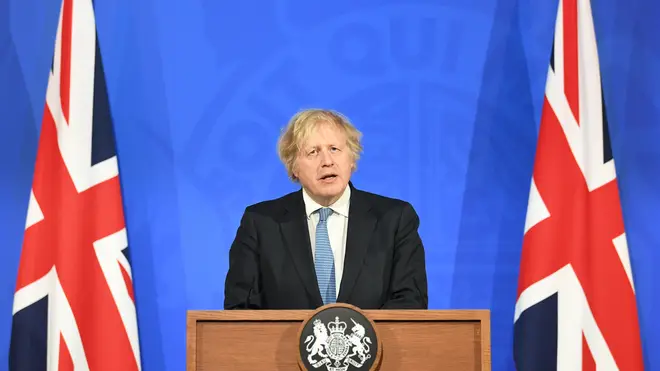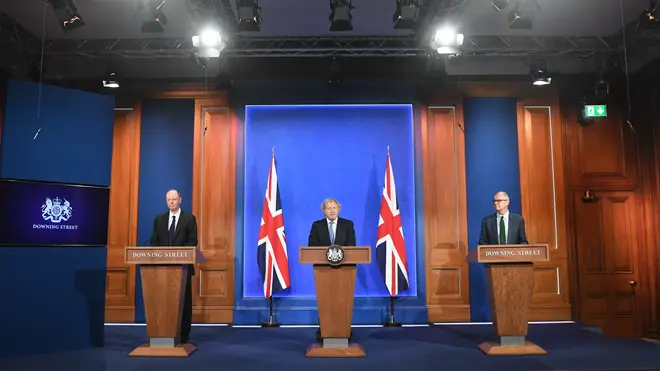
Ian Payne 4am - 7am
5 April 2021, 20:14

Boris Johnson: England's lockdown measures to be eased as planned on 12 April
Lockdown measures in England will be relaxed as planned on Monday 12 April, Boris Johnson has confirmed.
Speaking at the government's Covid-19 press briefing from Downing Street, the prime minister said he would be visiting a pub on that date as he confirmed the next stage of lockdown easing can go ahead.
He told reporters that the nation is on track to move to step two of its roadmap out of lockdown.
It means non-essential shops, gyms, zoos, personal care services and outdoor hospitality can reopen from 12 April.
Mr Johnson said the relaxation of restrictions is "fully justified" but warned the British public not to be complacent.
The UK leader was joined on Monday by England's chief medical officer Professor Chris Whitty and the government's chief scientific adviser Sir Patrick Vallance.
Read more: 'Vaccine passports' being trialled from mid-April, PM confirms
Read more: No date for return of foreign travel but traffic light system confirmed

The PM told the press conference: "The net result of your efforts and of course the vaccine rollout is that I can today confirm that from Monday 12 April, we will move to step two of our roadmap.
"Reopening shops, gyms, zoos, holiday campsites, personal care services like hairdressers and of course beer gardens and outdoor hospitality of all kinds.
"And on Monday 12, I will be going to the pub myself and cautiously but irreversibly raising a pint of beer to my lips."
He acknowledged that waves of Covid-19 could still trouble the country, as the virus has done elsewhere, therefore people need to remain cautious.
But the prime minister said the decision to approve the lockdown changes was supported by the official coronavirus figures.
As it happened: PM updates nation on relaxing England's lockdown
Read more: 'Traffic light' system for holidays abroad unveiled, but 'don't book this summer'

Boris Johnson outlines plans for trialling Covid vaccine passports
"We think that these changes are fully justified by the data, which shows that we are meeting our four tests for easing the lockdown.
"But - and you know I'm going to say this - we can't be complacent.
"We can see the waves of sickness afflicting other countries and we've seen how this story goes.
"We still don't know how strong the vaccine shield will be when cases begin to rise, as I'm afraid they will, and that's why we're saying please get your vaccine or your second dose when the turn comes.
"And please use the free NHS tests even if you don't feel ill."

Mr Johnson said he did not think, based on the current data, that there would be any deviation from his roadmap out of lockdown.
"We set out our road map and we're sticking with it," he said.
"And I want to stress that we see nothing in the present data that makes us think that we will have to deviate from that roadmap.
"But it is by being cautious, by monitoring the data at every stage and by following the rules - remembering hand, face, space, fresh air - that we hope together to make this road map to freedom irreversible."
He also confirmed vaccine passports are being trialled from mid-April to allow large-scale events in the UK to go ahead safely.

Virologist 'very worried' about 'confusing' traffic light system
The Covid-status certification system will allow higher-risk settings, such as football stadiums and festivals, to open up safely and with more participants.
It will take into account three factors: vaccination, a recent negative Covid-19 test, or natural immunity after having tested positive for the virus in the previous six months.
However, the prime minister did not give a set date for the resumption of foreign holidays but he did confirm ministers' plans for a traffic light system for international travel.
He said Brits must be "realistic" over the resumption of foreign holidays due to "a surge" of Covid-19 in popular destinations.
Mr Johnson told reporters "I wish I could give you more on that" but insisted there was not enough "solid data" on the virus.